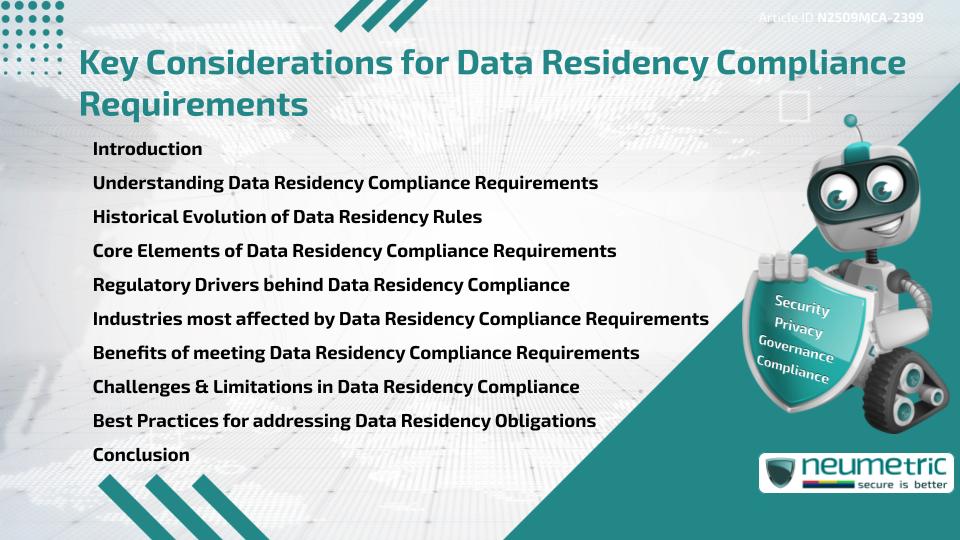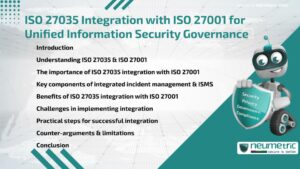Table of Contents
ToggleIntroduction
Data Residency Compliance Requirements define where Data must be stored, processed & managed to meet national or regional Regulations. These requirements are especially important in Industries handling Sensitive Information, where failure to comply can result in heavy Fines, Operational restrictions & Reputational damage. From GDPR in Europe to Data localisation laws in China, Russia & India, Regulations increasingly dictate how Organisations manage Data globally. This article explores the meaning of Data Residency Compliance Requirements, their history, regulatory drivers, benefits, challenges & best practices for Organisations to achieve Compliance effectively.
Understanding Data Residency Compliance Requirements
Data Residency Compliance Requirements mandate that specific categories of Data remain within certain Geographic boundaries. For example, some laws require Personal Data of citizens to be stored locally, while others restrict Cross-border Transfers unless adequate safeguards are in place. These requirements are designed to protect Privacy, National Security & economic sovereignty, making them a critical factor in Global Business Operations.
Historical Evolution of Data Residency Rules
In the early 2000s, Cross-border Data Transfers were loosely regulated. However, with the rise of Cloud computing & global Data flows, regulators began enacting strict rules. The European Union introduced GDPR in 2018, setting Global Standards for Data transfers & adequacy decisions. Countries like China, Russia & India followed with their own Localisation Laws, requiring Data to remain within National Borders. This evolution has made Data Residency Compliance Requirements a top priority for Multinational Organisations.
Core Elements of Data Residency Compliance Requirements
Strong Compliance with Data Residency Regulations involves:
- Data Classification: Identifying Data types subject to Residency restrictions.
- Storage Requirements: Ensuring certain Data remains within approved Jurisdictions.
- Transfer Controls: Applying safeguards like Standard Contractual Clauses for Cross-border Transfers.
- Encryption & Access Controls: Protecting Data at rest & in transit.
- Audit & Reporting: Demonstrating Compliance through documentation & regulator cooperation.
These elements ensure that Organisations can prove Compliance while managing Operational Risks.
Regulatory Drivers behind Data Residency Compliance
Several major frameworks drive Data Residency Compliance Requirements globally:
- GDPR: Restricts Cross-border transfers without adequate protections.
- China’s Cybersecurity Law: Requires critical Data & Personal Information to be stored locally.
- Russia’s Federal Law on Personal Data: Mandates local Storage of Russian citizens’ Data.
- India’s Personal Data Protection Bill: Introduces localisation requirements for Sensitive Data.
- NIST Guidance: Provides Best Practices for managing Data Security across jurisdictions.
These Regulations demonstrate the global shift toward strict Data sovereignty.
Industries most affected by Data Residency Compliance Requirements
Certain industries face heightened obligations under Data Residency laws:
- Healthcare: Patient Records must often remain within National Boundaries.
- Financial Services: Cross-border restrictions apply to Customer & transaction Data.
- Technology & SaaS Providers: Global Platforms must localise Data Storage to meet Client & Regulator demands.
- Government & Defense Contractors: Sensitive Information is often restricted to domestic Storage.
- E-Commerce & Retail: Customer Data must comply with Regional Privacy & Residency rules.
These industries rely on clear strategies to meet diverse & overlapping Data Residency Compliance Requirements.
Benefits of meeting Data Residency Compliance Requirements
When Organisations meet Data Residency Compliance Requirements, they achieve:
- Reduced Legal & Regulatory Risks
- Stronger Customer & Regulator Trust
- Improved resilience against Data sovereignty disputes
- Competitive advantage by demonstrating Compliance readiness
- Enhanced Security through localised Storage & stricter Controls
These benefits highlight Compliance as both a Legal obligation & a Business enabler.
Challenges & Limitations in Data Residency Compliance
Despite its importance, Data Residency Compliance presents challenges:
- High Infrastructure costs for maintaining Local Data centres
- Complexities of managing Hybrid Cloud & Multi-region Deployments
- Conflicting requirements across different Jurisdictions
- Operational inefficiencies caused by Data fragmentation
- Limited flexibility for Global Data Analytics & Innovation
These challenges require Organisations to carefully balance Compliance with Business Objectives.
Best Practices for addressing Data Residency Obligations
To manage Data Residency Compliance Requirements effectively, Organisations should:
- Conduct Data mapping to identify where Sensitive Data resides & flows
- Use Cloud Providers that offer region-specific Data Storage options
- Apply Encryption & strict Access Controls for localised Data
- Develop Contractual safeguards for International Data Transfers
- Establish regular Audits & reviews of Residency Compliance
- Monitor evolving Global Regulations & update Policies accordingly
These Best Practices ensure sustainable & adaptable Compliance strategies.
Conclusion
Data Residency Compliance Requirements are now a defining factor in Global Business Operations. By understanding Regulatory drivers, adopting strong Policies & implementing Best Practices, Organisations can reduce Legal Risks while strengthening Security & Trust. Effective Compliance transforms Residency from a challenge into a strategic advantage.
Takeaways
- Data Residency Compliance Requirements dictate where Data can be stored & processed
- Historical development accelerated with GDPR & National localisation laws
- Core elements include Classification, transfer Controls & Audit reporting
- Regulations in Europe, China, Russia & India drive Compliance obligations
- Key industries affected include Healthcare, Finance, Technology & Government
- Benefits include reduced Risks, stronger Trust & competitive advantage
- Challenges involve Infrastructure costs, Data fragmentation & conflicting Laws
- Best Practices include Mapping, Encryption, Audits & Cloud region Controls
FAQ
What are Data Residency Compliance Requirements?
They are Legal obligations that dictate where Data must be stored, processed or transferred to meet Privacy & Security Regulations.
Why are Data Residency Compliance Requirements important?
They protect Privacy, ensure national security & reduce Risks of Cross-border Data misuse.
Which Regulations mandate Data Residency?
GDPR, China’s Cybersecurity Law, Russia’s Personal Data Law & India’s proposed Personal Data Protection Bill are key examples.
How do Data Residency Compliance Requirements impact Cloud Services?
They require Organisations to use region-specific Storage options & ensure Cloud Providers meet localisation standards.
What industries are most affected by Data Residency Compliance?
Healthcare, Finance, Government, Technology & Retail face the strictest requirements.
What are the Risks of Non-Compliance with Data Residency requirements?
Fines, Reputational damage, restricted Market access & Operational disruptions.
How can Organisations prepare for Data Residency Compliance?
By mapping Data flows, using localised Storage, applying Encryption & monitoring Regulation changes.
Need help for Security, Privacy, Governance & VAPT?
Neumetric provides Organisations the necessary help to achieve their Cybersecurity, Compliance, Governance, Privacy, Certifications & Pentesting needs.
Organisations & Businesses, specifically those which provide SaaS & AI Solutions in the Fintech, BFSI & other regulated sectors, usually need a Cybersecurity Partner for meeting & maintaining the ongoing Security & Privacy needs & requirements of their Enterprise Clients & Privacy conscious Customers.
SOC 2, ISO 27001, ISO 42001, NIST, HIPAA, HECVAT, EU GDPR are some of the Frameworks that are served by Fusion – a SaaS, multimodular, multitenant, centralised, automated, Cybersecurity & Compliance Management system.
Neumetric also provides Expert Services for technical security which covers VAPT for Web Applications, APIs, iOS & Android Mobile Apps, Security Testing for AWS & other Cloud Environments & Cloud Infrastructure & other similar scopes.
Reach out to us by Email or filling out the Contact Form…





